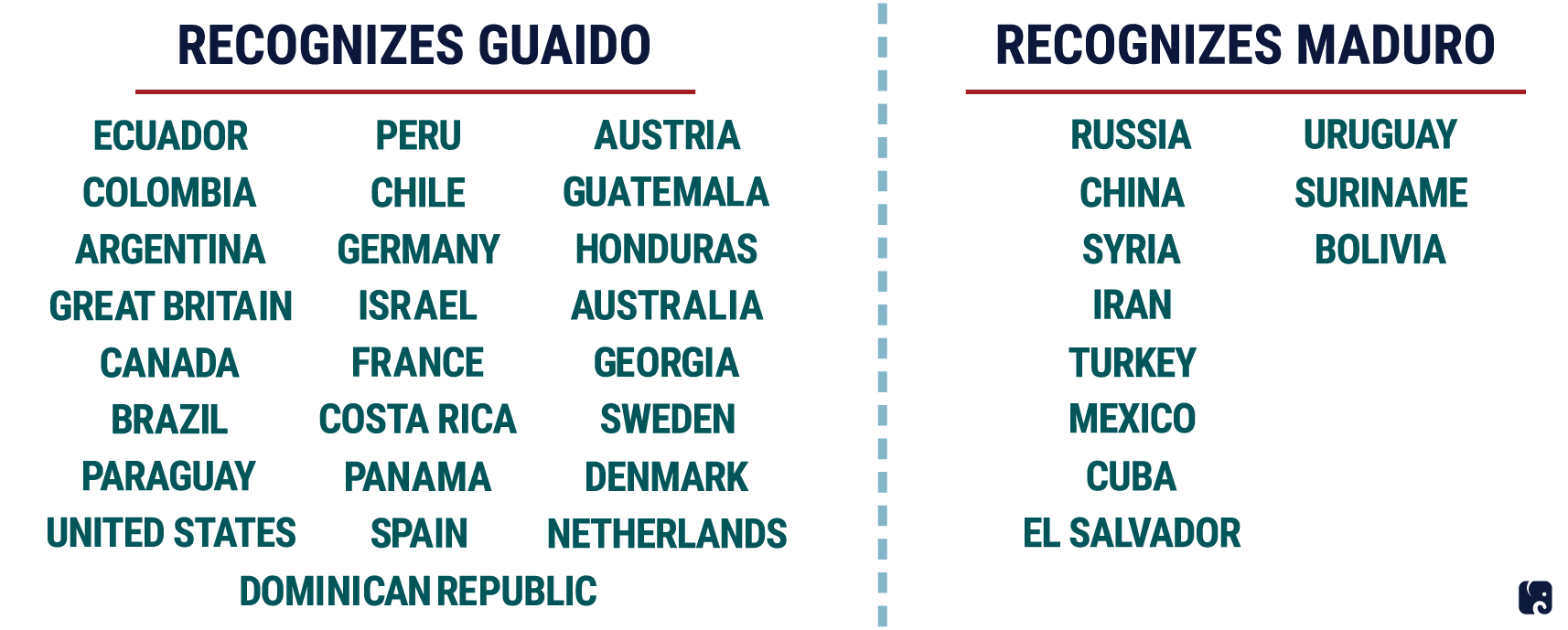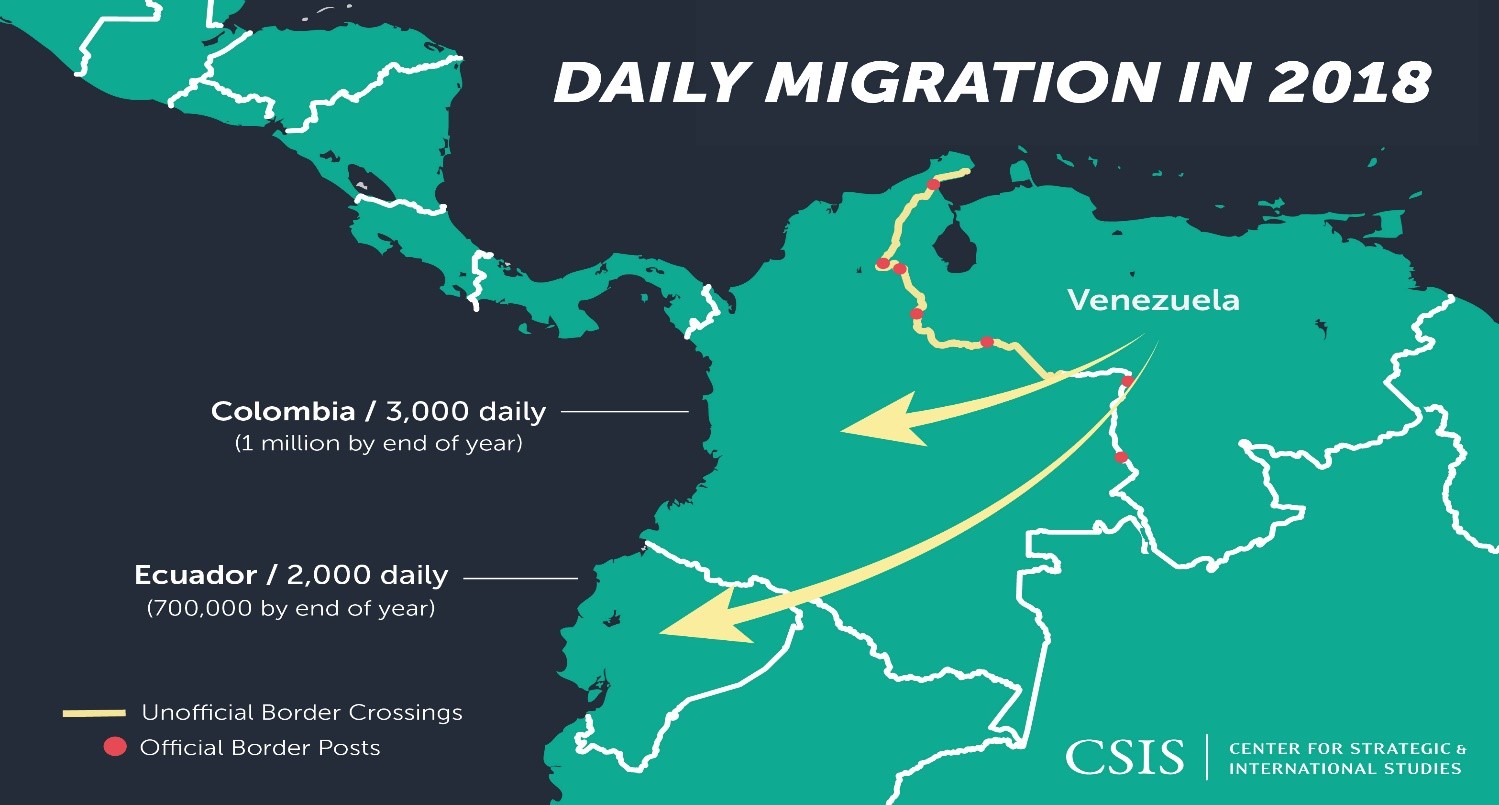Crises Mount in Venezuela
KEY TAKEAWAYS
- The United States recognized a new leader for Venezuela and has increased sanctions on the Maduro regime.
- Conditions in Venezuela are worsening, with much of the country in poverty and many Venezuelans malnourished or starving.
- The United States has joined many other countries around the world in recognizing Juan Guaido and pushing for the removal of Nicolas Maduro.
Venezuela’s humanitarian, political, and economic crises continue under the socialist regime of Nicolas Maduro. Food shortages, hyperinflation, and power outages plague the country, and public protests against Maduro are increasing, including in poor neighborhoods that are traditionally Maduro’s base of support. Maduro has cracked down on protests, especially in these poor neighborhoods. More than 3 million people are estimated to have fled Venezuela in the last three years.
Who recognizes whom as leader of Venezuela?

In May 2018, Maduro was re-elected as Venezuelan president in an election that was rejected as illegitimate by Venezuelan opposition parties, the United States, the Organization of American States, the European Council, and a coalition of Western Hemisphere governments coordinated by Canada. Maduro’s first term in office ended January 10, 2019, leaving the democratically elected National Assembly as the sole legitimate democratic institution. After the National Assembly formally declared that Maduro had usurped the presidency, Juan Guaido, leader of the Assembly, was sworn in as interim president of the country as provided in Article 233 of Venezuela’s constitution.
President Trump and Secretary of State Pompeo recognized Guaido as the legitimate president, quickly followed by recognition from Colombia, Brazil, Argentina, and Canada. On January 30, President Trump spoke with Guaido and offered his support. Venezuela’s military attaché in Washington also declared he would support Guaido and urged his fellow military officers to do the same.
While there is robust pressure for Maduro to step down, several nations – including Russia, China, Iran, Syria, and Cuba – are still backing him. This week, France, Spain, Germany, Britain, Portugal, Sweden, Denmark, Austria, and the Netherlands have stated their support for Guaido, and more countries continue to recognize him.
controversial elections in venEzuela
Nicolas Maduro took office in April 2013 following the death of Hugo Chavez and an extremely close election that was not fully accepted by the opposition party. In 2015, after losing elections, Maduro’s supporters in the National Assembly used the lame duck session to pack Venezuela’s version of the Supreme Court with Maduro allies. With seated Maduro allies, Venezuela’s Supreme Court illegally issued an order to suspend the National Assembly, and the government canceled a 2016 referendum to recall Maduro.
In 2017, Maduro ordered elections for a “constituent assembly,” ostensibly to rewrite the Venezuelan constitution but in reality to bypass the legitimate National Assembly. Opposition parties organized a successful counter-referendum and boycotted this election. The “constituent assembly” is controlled by hand-picked Maduro supporters.
Maduro then accelerated his own election, scheduled for December 2018, to May 2018. The United States, EU, and Organization of American States rejected the election’s outcome due to the regime’s oppression of rival political parties, imprisonment of some political officials, and the lack of time for the opposition to prepare for elections. Neither opponent of Maduro accepted the results.
Last month, Maduro was inaugurated for his second six-year term. The National Assembly declared the presidency vacant since the assumption of power for the second term was illegitimate. Juan Guaido, a 35-year-old engineer and leader of the National Assembly, was declared the interim president of Venezuela.
humanitarian crisis in venezuela
Venezuela’s humanitarian crisis is worsening, and hunger is a persistent concern. According to one university study, 9 of 10 Venezuelans live in poverty, and Venezuelans reported they lost an average of 24 pounds in 2017.
“The humanitarian situation demands action now; it demands action today. Today 9 out of 10 citizens live in poverty. Millions lack access to drinking water and food … Three million Venezuelans have been forced to flee their homeland … Maduro’s prisons are full of political prisoners unjustly behind bars and the graveyards hold dissidents and protesters that have been killed by this regime.” – Secretary of State Pompeo, 01-26-2019
Venezuelan law regulates the sale price, manufacture, and distribution of consumer goods. As a result, many private companies have stopped producing food. Maduro has repeatedly rejected offers of international food and medical aid. According to a report by the BBC, the Venezuelan military is now blocking food and medical aid from entering the country. Venezuelan opposition leaders claim Maduro fears accepting aid would send a message to the country that his socialist policies are not working for the people of Venezuela. They also charge that he does not want Venezuela to be dependent on capitalist nations for charity. On January 24, 2019, the State Department declared it intends to provide more than $20 million in humanitarian aid to the Venezuelan people. The Trump administration is also providing $97 million in refugee assistance for Venezuelans who have fled to other countries.

Around a tenth of Venezuela’s population has left the country due to the crisis. According to the Center for Strategic and International Studies, 3,000 people per day are leaving for Colombia and 2,000 per day for Ecuador.
U.S. sanctions on venezuela
On January 29, the State Department announced strict sanctions on Venezuela’s state-owned fuel and energy company, PDVSA. CITGO, an American oil and energy company based in Texas, with more than 5,000 locations in 30 states, is a subsidiary of PDVSA. These sanctions are intended to prevent the Maduro regime from accessing any revenues from Venezuela’s oil and are not meant to stop U.S. companies from buying Venezuelan oil. Unlike with most sanctions, the businesses may continue to operate and revenues may be made available to President Guaido’s forces and others opposing Maduro.
These were not the first sanctions against the Maduro government. In August 2017, President Trump announced restrictions on Venezuela’s access to U.S. financial markets in response to Maduro’s formation of the constituent assembly to rival the National Assembly. The administration added to these in March 2018 by prohibiting the buying, selling, or trading of any digital currency issued by or on behalf of the government of Venezuela. The regime had created a cryptocurrency called the petro, allegedly to obtain additional foreign currency reserves and evade international financial sanctions. Two months later, in May 2018, President Trump issued another executive order to prohibit the purchase of debt issued by Venezuela.
Next Article Previous Article
